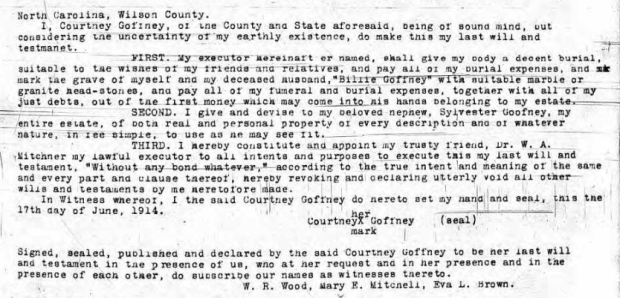This case reached the North Carolina Supreme Court on appeal from Wilson County Superior Court.
In summary, the lower court convicted Sylvester Goffney of housebreaking. He appealed; the Supreme Court reversed the decision and dismissed the case.
Goffney appealed on three grounds, the first two of which were deemed without merit. The third: “It is contended by the learned counsel for defendant in a well-prepared brief that, upon the state’s evidence, no crime has been committed, and with this position we fully agree.”
George Barnes and Joe Barnes were partners in Barnes Brothers, a business that Goffney was alleged to have broken into. One of the Barneses testified: “I know the defendant, have known him for four years. He has been in my employ for several years, during which time I found him honest. He assisted me in my store and business a portion of the time. In consequence of statements made to me by Richard Farmer, a negro boy in my employ, I instructed Richard to induce [Goffney] to break in my store. On the night of July 7th Policeman Wynne, myself, and others watched the store, and about 12 o’clock we saw the defendant, Sylvester Goffney, and Richard Farmer go to the store, and saw defendant, Goffney, remove tacks holding a window pane, and remove the window, and enter the store. Richard Farmer immediately afterwards also entered the store through the same window. Policeman Wynne, myself, and others, who were watching the store, after firing pistols, entered the store, and arrested the defendant, Goffney, and required said Farmer to accompany us.” The only other witness corroborated Barnes.
The court’s determination: In the case at bar it appears that Barnes, the owner of the building entered, directed his servant Richard Farmer to induce the defendant to break in his (Barnes’) store; that the servant obeyed his orders, and that he and defendant entered the store together, and that Barnes was present watching them, and arrested defendant after he entered.
If it were possible to hold the defendant guilty of a felony under such circumstances, then Barnes could be likewise convicted of feloniously breaking and entering his own store, for he was present, aiding and abetting the entry of the defendant and induced him to enter. That would of course be a legal absurdity.
“Upon the facts in evidence, no crime was committed because the entry was with the consent and at the instance of the owner of the property. His honor should have directed a verdict of not guilty. Reversed, and proceeding dismissed.”
——
Here’s how the Wilson Daily Times reported the trial:






Wilson Daily Times, 11 July 1911.
A few interesting points from this account:
- The Barnes Brothers operated a store in Samuel H. Vick‘s Odd Fellows building on East Nash Street “below the railroad.”
- Sylvester Goffney had recently left their employ to go work for veterinarian Elijah L. Reid. The Barneses’ had regarded him as a trustworthy employee.
- One of the Barnes brothers slept on a cot in the store. Goffney stopped by to visit, fell asleep and spent the night in the store.
- The next day, Richard Farmer, an employee described as a “little boy” or “little negro,” cautioned Barnes that Goffney had solicited his help to rob the store — and cut Barnes’ head off.
- The next time Goffney visited, Barnes refused to let him in. He later heard someone try the door, fired a shot, and all went quiet.
- Barnes then directed Farmer to conspire with Goffney to break into the store. Barnes and a policeman hid while Farmer and Goffney entered through a window, then arrested both.
- On the stand, Farmer testified that Goffney also planned to rob the restaurant of Richard Gaither, “a cripple and blind negro” and “fix” his wife.
Two months later, the Times reported a verdict:

Wilson Daily Times, 8 September 1911.
——-
In the 1900 census of Wilson, Wilson County: teamster William Gwaltney [Goffney], 56; wife Courtney, 50; step-son John Bunn, 25, blaksmith; and nephew Sylvester Gwaltney, 6.
In the 1910 census of Wilson, Wilson County: on Stantonsburg Street, widow Courtney Goffney, 50; Ada Battle, 30(?), graded school teacher; and lodger Sylvester Goffney, 16, factory laborer.
In the 1912 Hill’s Wilson, N.C., city directory: Goffney Sylvester lab h 409 Stantonsburg Road
In 1914, Sylvester Goffney was designated beneficiary of the estate of his aunt, Courtney Goffney.
In 1918, Sylvester Goffney registered for the World War I draft in Wilson. Per his registration card, he was born 10 August 1894 in WIlson; resided at 147 Suggs Street, Wilson; and was unemployed. [Goffney signed his card with a firm, strong signature, evidence of a good education and opportunity to practice.]
In the 1920 census of Detroit, Wayne County, Michigan: auto factory laborer Sylvester Goffney, 25, was a lodger in the household of Ida L. Taylor, 42, on Saint Antoine Street.
In the 1930 census of Detroit, Wayne County, Michigan: at 2135 Riopelle Street, Sylvester Goffney, 35, roomer, porter in barbershop.
In January 1937, Sylvester Goffney applied for a Social Security number. Per his application, he was born 10 August 1894 in WIlson, North Carolina, to Christopher Goffney and Kate McCowan.
In the 1940 census of River Rouge, Wayne County, Michigan: renting at 450 Holford Street, Sylvester Goffney, 45, porter at veterans hospital, and wife Mattie, 41, confectionery clerk.
In 1942, Sylvester Oliver Goffney registered for the World War II draft in Wayne County, Michigan. Per his registration card, he was born 10 August 1894 in Wilson, N.C.; lived at 450 Holford Street, River Rouge, Michigan; his contact was Mrs. P. Henry, 475 Holford; and he was unemployed.
In the 1947 Wyandotte, Michigan, city directory: Goffney Sylvester (Mattie) conf 518 Elliott h 516 [Elliott]
Sylvester Goffney died 22 March 1948 in River Rouge, Wayne County, Michigan. Per his death certificate, he was born 10 August 1894 in Wilson, N.C., and was married.




















